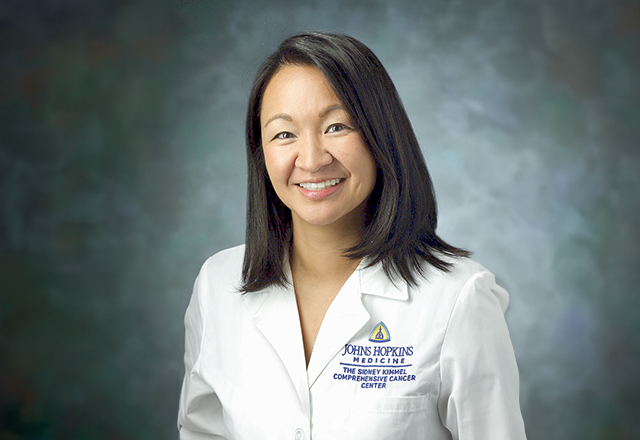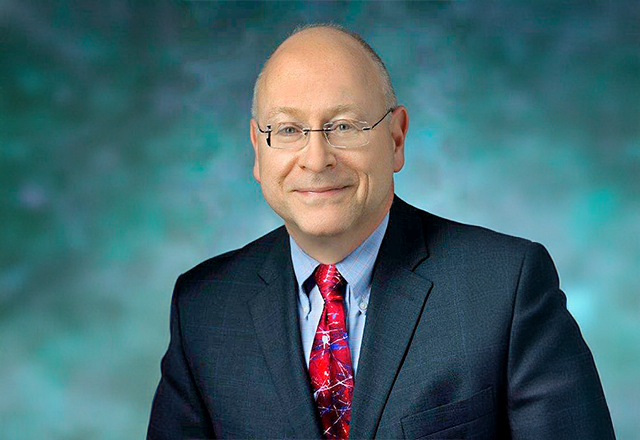A Model Clinic
At most hospitals across the country, diagnosis and treatment revolved around the care team, with a series of visits with medical, surgical and radiation oncologists and other specialists at different locations. Numerous appointments for tests, care decisions and treatments were spread out over time. At the Kimmel Cancer Center, our experts started following an opposing model, in which the care team revolved around the patient in one central location.
The Johns Hopkins multidisciplinary clinics — the multiDs, as they are known — were born out of the desire for the Center’s clinical programs to match the strength of its basic science research programs. They have played a vital role in improving the treatment of difficult cancers, such as pancreatic, liver and lung cancers, and others.
“I can’t think of another place like this, with this level of interaction,” says Bert Vogelstein, M.D., Clayton Professor of Oncology and co-director of the Ludwig Center for Molecular Therapeutics, whose genetic discoveries were an example of the basic science woven throughout the multi-Ds, informing and improving cancer diagnostics and treatment. “You can’t manufacture that kind of environment. It has to be built from the ground up, and we’re very fortunate to have it here.”
Our experts envisioned a clinic in which patients could come to the Kimmel Cancer Center, and after a single day’s visit, receive an integrated treatment plan representing the multispecialty expertise of all specialists involved in the treatment of each cancer type. The multidisciplinary care model ensured that every expert involved in the treatment of a particular cancer has a seat at the table when recommending a treatment plan to the patient. The clinic seamlessly incorporated all elements of cancer care, including diagnosis, therapy, follow-up care and surveillance, palliative medicine and survivorship.
 Feliciano
Feliciano“We’re not just discussing the treatments that patients will need for their particular cancer, but also what other resources we will need to enlist for each patient based on what we know about them, their medical history, social history, and their life circumstances, because treatment isn’t just about the cancer itself,” says Joy Feliciano, M.D., thoracic cancer expert and Cancer Diagnostic Clinic medical director. “It’s about how this patient might need rides to chemo, or that one might need us to coordinate care with their cardiologist because they have a pacemaker.”
The clinics marked a major step forward from the early days of the Center, when cancer care was often a singular approach. If a tumor could be removed with surgery, the patient was treated first by a surgeon then handed off to medical and radiation oncologists for chemotherapy and radiation therapy.
A radiologist would image the tumor and send a report to the oncologist. All of the experts would perform their tasks well, but there was no concerted effort.
The multidisciplinary care model ensured that every expert involved in the treatment of a particular cancer literally has a seat at the table when recommending a treatment plan to the patient.
 WOLFF
WOLFF“Cancer therapy transcends the boundaries of medical and surgical disciplines, so it was important to have all of the key players involved in the plan and execution of therapy from the onset,” says Elizabeth Jaffee, M.D., deputy director of the Kimmel Cancer Center and co-director of the Skip Viragh Center for Pancreas Cancer Clinical Research and Patient Care. “The department lines have really been blurred here. Our patients are getting a first, second and third opinion all at the same time.”
 HOLDHOFF
HOLDHOFFThis single-day approach is highly unusual in cancer care, says Russell Hales, M.D., radiation oncologist and director of the Thoracic Oncology Multidisciplinary Clinic. His research has helped prove its benefits.
Although he knew patients liked the multi-Ds, he wanted to be sure, by examining objective data, that it was the best approach for them. In 2017, he compared outcomes of patients with lung cancer who received care through the multidisciplinary clinic with patients who received their care outside of the clinic with individual providers through a more traditional care model.
 VOONG
VOONGTheir findings showed that one-year survival at the clinic was 82% compared with 64% for patients treated outside the clinic. The next year, Kimmel Cancer Center radiation oncologist Ranh Voong, M.D., presented additional findings showing that the clinic provides a cost savings of 30% over traditional care, presumably because patients receive more streamlined planning and treatment, avoiding unnecessary appointments and tests.
 LAHERU
LAHERU“You don’t see this magnitude of improvement in some of the newer drugs coming out, and it’s even more significant because patients in the health care system are saving money,” says Hales.
The Kimmel Cancer Center has a multidisciplinary clinic for every cancer type.
Patients travel from around the world, across the U.S., and throughout the state and region.
 SHARFMAN
SHARFMAN“This kind of care is in the DNA of the Kimmel Cancer Center,” says Director William Nelson, M.D., Ph.D. “The collaboration across disciplines is part of our history, and it continues today. We never forget the science, and that puts us at the forefront of clinical breakthroughs.”
Specialty Centers
A snapshot of our many specialty centers emerged from this multidisciplinary model of care and the generosity of donors who made the centers possible:
Blood and Bone Marrow Cancers (Hematologic Malignancies) and Bone Marrow Transplant
Directed by Richard Jones, M.D., professor of oncology, and Richard Ambinder, M.D., Ph.D.
Brain Cancer Disease Group and Brain Tumor Specialty Center
Directed by Matthias Holdhoff, M.D., Ph.D., associate professor of neuro-oncology, neurology and neuro-surgery, and John Laterra, professor of neurology, neuroscience and oncology.
Colorectal Cancer Research Center of Excellence
Directed by Nilofer Azad, M.D., professor of oncology.
The Greenberg Bladder Cancer Institute
Directed by David McConkey, Ph.D.
Liver Cancer Multidisciplinary Clinic
Directed by Mark Yarchoan, M.D., associate professor of oncology.
Melanoma and Skin Cancer Multidisciplinary Program
Directed by Suzanne Topalian, M.D., Bloomberg~Kimmel Professor of Cancer Immunotherapy, and William Sharfman, M.D., Mary Jo Roger Professor of Cancer Immunology and Melanoma Research. Clinical co-directors are Julie Lange, M.D., associate professor of surgery, and Elise Ng, M.D., assistant professor of dermatology.
Prostate Cancer Multidisciplinary Clinics and the Precision Medicine Center of Excellence for Prostate Cancer
Co-directed by Michael Carducci, M.D., AEGON Professor of Prostate Cancer Research, and Sam Denmeade, M.D., professor of oncology and pharmacology and molecular sciences. Prostate cancer research at the Brady Urologic Institute is directed by Ken Pienta, M.D., professor of urology, oncology, and pharmacology and molecular sciences. Clinical research is directed by Channing Paller, M.D., associate professor of oncology and urology.
The Skip Viragh Center for Pancreas Cancer Clinical Research and Patient Care
Co-directed by Elizabeth Jaffee, M.D., the Dana and Albert “Cubby” Broccoli Professor of Oncology, and Daniel Laheru, M.D., Ian T. MacMillan Professor of Pancreatic Cancer Research.
Precision Medicine Center of Excellence for Pancreatic Cancer
Directed by Lei Zheng, M.D., Ph.D., professor of oncology.
Thoracic Cancer Center of Excellence and Precision Medicine Center of Excellence for Lung Cancer
The Thoracic Oncology Program is directed by Julie Brahmer, M.D., professor of oncology, and the Thoracic Oncology Multidisciplinary Program is directed by Russell Hales, M.D., assistant professor of radiation oncology and molecular radiation sciences. The Precision Medicine Center is directed by Valsamo “Elsa” Anagnostou, M.D., Ph.D., and Joseph Murray, M.D., Ph.D.
Under Armour Breast Health Innovation Center and Women’s Malignancies
Directed by Vered Stearns, M.D., breast cancer research chair in oncology and director of the Women’s Malignancies Program, and Antonio Wolff, M.D., interim director.
